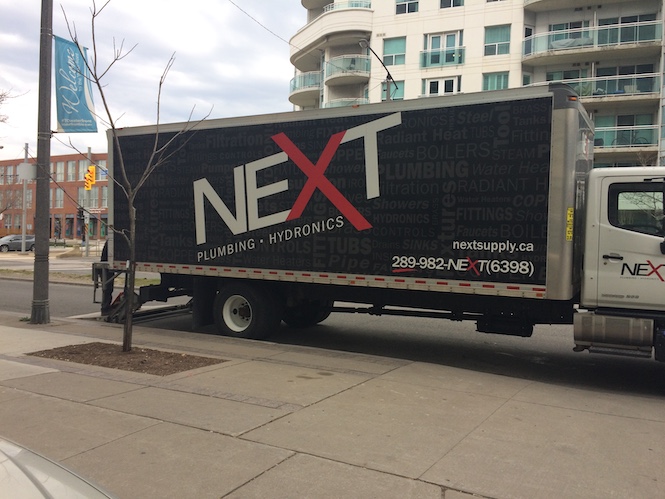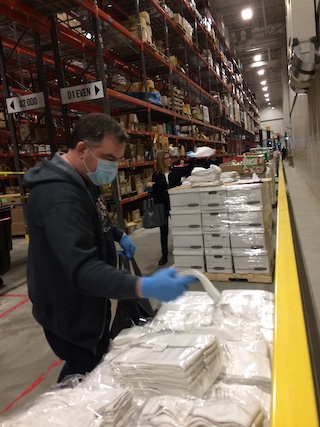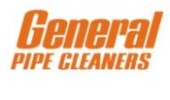
In Conversation: Helping the homeless and adapting to new realities during the pandemic
May 7, 2020 | By Doug Picklyk
We spoke with Michael Storfer and Carolina Lorenz of NEXT Supply, the plumbing and hydronics wholesaler in the Greater Toronto Area, about maintaining its commitments to its customers, co-workers and community in these challenging times.

NEXT Supply truck drops off 100 survival kits for distribution to the homeless along Toronto’s waterfront.
In business for seven years, NEXT Supply is a wholesale supplier focused on plumbing and hydronics with 11 locations in the Greater Toronto Area. On April 29th NEXT workers packed 500 survival kits for people living on the streets and in encampments in downtown Toronto. This initiative is just one of the ways the company has participated in giving back to its community since the COVID-19 pandemic. We spoke with company CEO, Michael Storfer, and marketing manager, Carolina Lorenz, to learn more about how NEXT has been managing through these unusual times.
What’s it been like running a wholesale business during COVID-19?
Michael Storfer: It’s a different environment for sure, making sure your people are safe and keeping in constant communication. I think I spend more time on Zoom than anywhere else right now.
I have meetings with every branch manager and sales staff, even if it’s just for five minutes, touching base every day making sure that we’re communicating constantly. And I do a weekly meeting with all the staff on Wednesdays to go over what’s happening internally and in the marketplace.
So you are in greater contact with your staff than before?
Michael Storfer: Oh yes, absolutely. And I think they’ll be happy when we stop communicating so much, but right now we have to maintain a safe environment for everybody. And we’re trying to focus on what we can do from a community perspective as well. Our core values as a company include being integral to our customers, our co workers and our community. And I think that’s easy to say when there’s no pandemic, but when things begin to happen, that’s when you realize whether your values are a slogan or you truly believe in your brand.
How did the survival kits for the homeless initiative come about?
Caroline Lorenz: Michael has always felt extremely strong about the company’s philanthropic efforts, so as soon as the pandemic happened a number of our stakeholders and co-workers were asking, “What can we do to help?”
We found an organization called the Seeds of Hope Foundation, a grassroots group that deals directly with people in the shelter system and on the streets. They work in transitioning homeless people from shelters into homes

Brad, manager of NEXT’s Markham location, in the assembly line helping pack kits for the homeless.
This organization is providing displaced homeless with tents so that they can self isolate, but they are also in need of food and other necessities. So we collected items the Foundation requested, and our employees made 1,000 sandwiches and a few even made homemade masks as well.
We set up a socially-distanced assembly line in our warehouse and packaged kits containing a variety of items including two water bottles, two sandwiches, a meal replacement bar, a meal replacement drink, snacks, a face cloth, socks, toiletries, as well as activity books and pens.
500 kits were loaded into big totes and shipped to the Foundation where their volunteer staff delivered them out to the streets.
I actually traveled along with a crew making deliveries along the Lakeshore. The people in these encampments, they have faces and they have stories to tell. There was one young fellow I met, a student, who chose to pay his tuition and that didn’t leave any money for rent. He’s trying to do the right thing, but he just can’t make ends meet.
Are there other community initiatives you’ve become involved in since COVID-19?
Carolina Lorenz: We’re also involved with an initiative called the Friendly Neighbor. It’s a hotline for seniors being run through the University Health Network’s OpenLab in Toronto. A recent start-up, it’s helping vulnerable seniors—a group most at risk during the COVID-19 pandemic—by mobilizing volunteers to deliver groceries and other household goods to seniors in need.
We sent out a link to all of our staff, and anyone who wishes to volunteer their time can participate and the company will support them if they need to make a pick-up or delivery during work hours.
What changes have you had to make for your staff and customers?
Carolina Lorenz: We’ve implemented a number of safety protocols, including changing shifts so there is less overlap, enforcing social distancing, not taking returns, along with enhanced safety and hygiene measures, including extra cleaners coming in at night to make sure that everything’s wiped down,
And while many wholesalers are only allowing phone orders and curbside pick-up, we’re still allowing a limited number of people to enter locations. Some customers have been saying it’s actually hard to find a place to wash their hands.
Have you had different requests from contractors, like additional PPE?
Michael Storfer: Yes, the hard thing, quite frankly, is keeping items in stock. Our first priority is our own staff. We actually purchased a bunch of hand sanitizer very early and chose to give it away to contractors. And it’s amazing, the impact from a customer perspective, in terms of how happy they were to get hand sanitizer.
Do you foresee this pandemic having a long-term effect on the way you do business?
Michael Storfer: I think that everyone’s just trying to figure it out. And I think there’s absolutely a realization that this is not a one month change. This is just going to be a way of life potentially forever.
Right now about 75% of our staff are working remotely, and I can see the nature of sales calls changing going forward. I think we’ll find different ways of bringing value. And in some cases, I think that value is going be much higher.
How is business right now?
Michael Storfer: Across the board everything is just slower. I budgeted a horrific April, and I was really surprised that it was as strong as it was. A lot of our customers were pretty slow, but then other customers were busy enough and because we remained accessible, that mattered. I think that we ended up helping some people out, and that helped our sales numbers at the end of the day.
Have there been any pleasant surprises you’ve encountered during this unusual time?
Michael Storfer: That our staff have remained so calm, and I give credit to our managers for that. And I do appreciate the leadership we’re seeing from the federal, provincial and municipal governments.
And from a customer perspective, I think that in general our customers have been responsible. A lot of our customers are not big businesses, and they may not have huge cash reserves, but in general they are putting their staff first and not putting them in unsafe environments.




